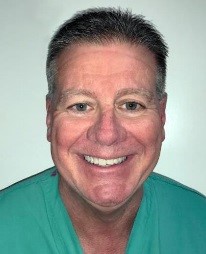
As a longtime registered nurse in the Cardiac Catheterization Lab at Lakeland Regional Health Medical Center, Eddie Gee (pronounced jee) figured the healthy and active life he was leading would keep him from heading down the same road as some of his patients.
That was before he turned 52 and began having an irregular heartbeat, called atrial fibrillation. Atrial fibrillation is rapid, uncoordinated heartbeats that start in the hearts upper chambers, known as the atria.
The North Lakeland father of two regularly lifts weights at Gold’s Gym. He likes to hunt and fish. Though atrial fibrillation has been prevalent in Mr. Gee’s family, the thought of dealing with cardiologists and hospitals at middle age hardly occurred to him.
On two occasions, Heart Center care teams used “paddles” to shock his heart back into a normal rhythm. But that lasted only short term, and the blood thinners he was prescribed weren’t a long-term solution either. His cardiologist talked to him about the pros and cons of undergoing an atrial fibrillation ablation. An ablation is a minimally invasive procedure used to treat some types of rapid heartbeats. During the procedure, a physician guides a catheter with an electrode at its tip to the area of heart muscle where the damaged site is located. Then a mild, painless radio frequency energy (similar to microwave heat) is transmitted to the site of the pathway. Heart muscle cells in a very small area (about 1/3 of an inch) die and stop conducting the extra impulses that cause the rapid heartbeats.
Lakeland Regional Health’s Heart Center physicians have performed more than 500 atrial fibrillation ablations. As first in the region to perform many life-saving cardiac procedures, the Heart Center’s more than 30 years of experience is unmatched locally.
Mr. Gee’s procedure took about five to six hours, and he spent four days at the hospital to monitor his progress. Full recovery takes several months and involves a strict medicine regimen to ensure heart rhythm returns to normal. Mr. Gee returned to work on light duty in a week.
“I’m very passionate about talking about atrial fibrillation,” Mr. Gee shared. “It’s a scary thing. It changes your whole life. I try to talk with people who are younger than 60 so they know the symptoms to look for.”
